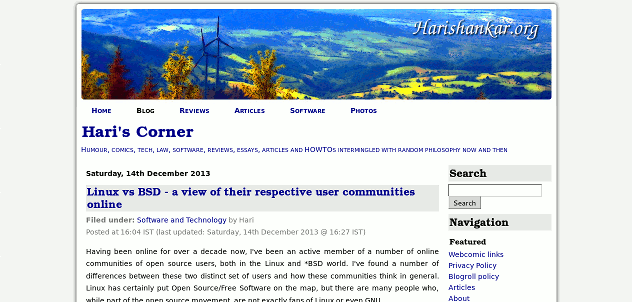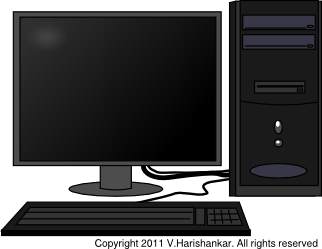A portrait of Tamil comedy actor, Senthil, famous for his dynamic partnership with fellow comedian Goundamani. Hope I captured his mock "innocent hurt" look in this one!

Filed under:
Artwork/Portraits/Caricatures by
Hari
Posted on Mon, Dec 30, 2013 at 14:42 IST (last updated: Mon, Dec 30, 2013 @ 14:42 IST)
A portrait of Tamil comedy actor, Senthil, famous for his dynamic partnership with fellow comedian Goundamani. Hope I captured his mock "innocent hurt" look in this one!

Filed under:
Site management by
Hari
Posted on Mon, Dec 23, 2013 at 19:08 IST (last updated: Mon, Dec 23, 2013 @ 19:08 IST)
As is usual on this website at regular intervals, I have once again updated the style of this website. This time, I've chosen a fluid-width look. As always, feedback is welcome.
Here's a screenshot of the earlier style of this website for posterity.

Although I've not done this before, I think this would be useful for me to remember how this website looked earlier. I wish I had thought of this every time I changed the look of this site earlier..
Filed under:
Software and Technology by
Hari
Posted on Sat, Dec 14, 2013 at 16:04 IST (last updated: Sat, Dec 14, 2013 @ 16:27 IST)
Having been online for over a decade now, I've been an active member of a number of online communities of open source users, both in the Linux and *BSD world. I've found a number of differences between these two distinct set of users and how these communities think in general. Linux has certainly put Open Source/Free Software on the map, but there are many people who, while part of the open source movement, are not exactly fans of Linux or even GNU.
In my many interactions and in observing discussions in these communities, here are my observations. Note that these observations are general in nature and the fact that a lot of Linux users also tend to be BSD users which tend to blur the distinctions somewhat. Also some of the observations are quite specific, but they reflect the general philosophical differences between these two open source communities.
Filed under:
Software and Technology by
Hari
Posted on Tue, Dec 10, 2013 at 10:14 IST (last updated: Tue, Dec 10, 2013 @ 10:18 IST)
There are so many debates on the Internet about "Linux on the Desktop" or "BSD on the Desktop" that a lot of people seem to hide behind vague statements like "no two people are agreed on what a desktop actually is" or that the concept of a desktop is too vague to define for most people. Yet others prefer to club desktops with window managers (which are mere graphical workspaces, as opposed to text consoles).
Often the debate is blurred between what desktop users actually do, and what a desktop system is supposed to provide, which causes immense conflict in debates. To my mind, they are two different topics. A desktop system should provide a basic environment which makes it easy for desktop users to use their applications without too much system level configuration, manually having to tie together various components which make the system and/or having to use disparate paradigms to achieve one task (i.e. manually editing configuration files for some services and using GUI tools for others).
I think that a desktop environment or a desktop OS should provide, minimally at least the following services:
Note that in the above, I don't include 2D or 3D video hardware acceleration, which depends on hardware drivers, and which is not strictly necessary for desktop usage, although some of the functionality of the desktop may be affected by the lack of it (for instance media playback, video gaming and also visual frills like desktop compositing). I've also not included software management, which depends on the OS in question, though GUI software management makes life easier for desktop users.
I consider the above as necessary components of any modern desktop system and I'm sure a lot of desktop users would tick off at least some of the above components as being necessary. People who use plain Window Managers on UNIX-like OSes aren't necessarily desktop users. They are simply running GUI applications in a graphical workspace. Graphical interfaces may be used in a workstation or sometimes even on a server, but they are not desktop systems in the sense I've mentioned above.
I think most debates about desktop usage should have a clear frame of reference of what a desktop computer is supposed to provide as a bare minimum, as opposed to what desktop users want to do, which is a whole different topic.
Filed under:
Life and Leisure by
Hari
Posted on Sun, Dec 1, 2013 at 15:21 IST (last updated: Sun, Dec 1, 2013 @ 15:30 IST)
 The old desktop at home was gathering dust since nobody in my family really uses it any more. Almost everybody has a laptop these days.
The old desktop at home was gathering dust since nobody in my family really uses it any more. Almost everybody has a laptop these days.
I then decided that it could be very well be used in my office room. Instead of having to carry my laptop to the office, I could use a desktop system. All I needed was a new UPS (the old one had conked out) and a PCI Wireless adapter (since the router is upstairs, and drawing the ethernet cable to the office would require a lot of cable!).
To be sure, it has its flaws (lack of a proper AGP card and 3d graphics - since the old Radeon 9600 died, I was forced to use an ATI Rage XL PCI card). The system itself has two 80GB SATA hard disks, a HP DVD-writer and is powered by an AMD Sempron 2600+ processor. It's good enough for office work since I won't be using it for multimedia or graphics heavy applications. I installed Debian Wheezy afresh, alongside Windows XP (which is on the first hard disk), and got it set up for regular office work. I had a bit of trouble with random disconnections with the TP Link WiFi card and the atheros ath9k driver, but it appears to have been resolved now.
All in all, it is a satisfying experience to re-use old computers and components. Laptops are incredibly convenient in a lot of ways, but they lack the ease of component replacement in a desktop system. Also it feels good to use a proper desktop system after a long time. Just feels like I am using a computer again.
Filed under:
Site management by
Hari
Posted on Mon, Nov 11, 2013 at 10:42 IST (last updated: Mon, Nov 11, 2013 @ 10:50 IST)
Setting an updated PHP version on this site has led to some strange effects on this blog. Like the non-display of some pages. Unfortunately PHP is a really unstable language that keeps changing its behaviour on every update. Many functions become deprecated over time, a few change their behaviour and yet others fail silently. The worst part is that, unless you enable error reporting globally, it is very difficult to track down the source of subtle bugs caused by these.
I have now reverted the server-type to the older version of PHP on my web host so that the site continues working normally as before.
I coded the back end for this blog in 2008 and made a complete move to the new software from b2evolution back then, so the code is slightly long in the tooth. But I cannot understand how such a widely used, popular web development language like PHP can be so unstable from version to version, made worse by the fact that some language features are dependent on the configuration settings in php.ini. There ought to be long-term API stability in a language like PHP. I hate having to update my code for every major (or even minor) revision of PHP. Thank god for web hosts who recognize this and give uers the option of earlier versions.